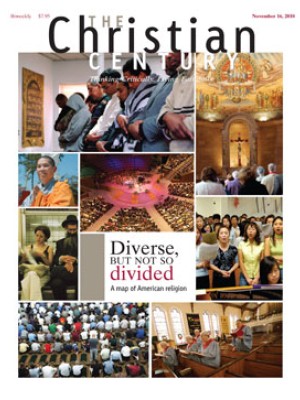Are more Bible versions bad for the Good Book?
If you stacked all the Bibles sitting in American homes, the tower
would rise 29 million feet, nearly 1,000 times the height of Mount
Everest.
More than 90 percent of American households own a Bible
and the average family owns three, according to pollsters at the Barna
Group. The American Bible Society hands out 5 million copies of the
scriptures each year; 1.5 billion Gideon Bibles are available in hotel
rooms worldwide.
Scripture outsells the latest diet fads, murder
mysteries and celebrity bios year after year. Evangelical publishers
alone sold an estimated 20 million Bibles in recession-battered 2009,
raking in about $500 million in sales, according to Michael Covington,
information and education director of the Evangelical Christian
Publishers Association.
Read our latest issue or browse back issues.
Experts say it's nearly impossible to
calculate exactly how many Bibles are sold each year. But one thing is
clear: the Good Book is great for business. "Bibles are in many ways a
cash cow," said Phyllis Tickle, a former longtime religion editor at Publishers Weekly. "The Bible is the mainstay of many a publishing program."
However,
some Christian scholars wonder whether too much Good News can sometimes
be a bad thing—as a major new translation and waves of books marking
next year's 400th anniversary of the venerable King James Bible
inundate the market.
The assortment of translations and "niche
Bibles" (think, The Holy Bible: Stock Car Racing Edition) sow confusion
and division among Christians, invite ridicule from relativists and
risk reducing God's word to a personal shopping preference, some
scholars say.
"I think we are drifting more and more to a diverse
Babel of translations," said David Lyle Jeffrey, former provost of
Baylor University and an expert on biblical translations. Jeffrey
believes that Americans need a "common Bible"—a role the King James
Version played for centuries—to communicate the grandeur of scripture
without reducing it to "shopping-center-level" discourse.
"When
we have so much diversity we lose our common voice," he said. "It is in
effect moving away from a common membership in the body of Christ into
disparate, confusing misrepresentations of the rich wisdom of
scripture, which ought to unify us."
Leland Ryken, an English
professor at Wheaton College, a leading evangelical school in Illinois,
was more blunt. "When there is wide divergence among Bible
translations, readers have no way of knowing what the original text
really says," Ryken said. "It's like being given four different scores
for the same football game, or three contradictory directions for
getting to a town in the middle of the state."
Despite the
Bible's ubiquity, Americans are not necessarily reading or absorbing
the contents, said Paul Franklyn, associate publisher of the Common
English Bible, a new translation sponsored by five publishers for
mainline denominations—the Episcopal Church, the Presbyterian Church
(U.S.A.), the United Methodist Church, the United Church of Christ and
the Disciples of Christ.
For example, half of Christians cannot
name the four Gospels and a third cannot identify Genesis as the
Bible's first book, according to a recent study conducted by the Pew
Forum on Religion & Public Life.
The new Common English Bible
aims to present an easy-to-read translation from the "theological
center," Franklyn said. Its New Testament debuts this fall; the entire
Bible is due next year.
Despite the profitability of Bible
publishing, penetrating the crowded and competitive market is a "big
risk" requiring equal parts scholarship and salesmanship, Franklyn
said. The Common English Bible publishers spent $1 million on the
translation and will dole out another $3 million to get people to "pay
attention" to it, he said.
Scholars estimate that at least 200
English translations have been published since 1900—many of them
revisions of earlier texts. Sorting out the differences between the New
American Bible and the New American Standard Bible, for example, can be
daunting even for experienced readers.
The market can be so
confusing and crowded that half of the customers who visit Christian
stores to buy a Bible leave without one, according to a study presented
to Christian retailers in 2006.
"Heck, I'm overwhelmed and I'm supposed to know what the hee-haw I'm doing," said Tickle, author of The Great Emergence, a
well-regarded book on the future of Christianity. "Bibliolatry is not
a word I use very often, but we are probably veering very close to
it." —RNS






